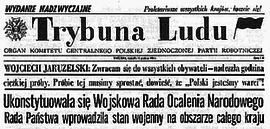Trybuna Ludu
Trybuna Ludu (Polish pronunciation: [trɨˈbuna ˈludu]; People's Tribune) was one of the largest newspapers in communist Poland, which circulated between 1948 and 1990. It was the official media outlet of the Polish United Workers' Party (PZPR) and one of its main propaganda outlets along the televised news program Dziennik.
| Type | Daily newspaper |
|---|---|
| Format | Broadsheet |
| Owner(s) | Polish United Workers' Party (PZPR) |
| Publisher | Warszawa : Central Committee of PZPR |
| Founded | 16 December 1948 |
| Political alignment | Communist Socialist |
| Language | Polish |
| Ceased publication | 28 January 1990 |
| Headquarters | Warsaw, Poland |
| Circulation | 1,900,000 (1989)[1] |
| OCLC number | 2268743 |
History
Creation
On 16 December 1948, Poland's primary two communist parties, the Polish Socialist Party and the Polish Workers' Party, were combined to form Polish United Workers' Party. The parties' respective newspapers, Robotnik and Głos Ludu, were merged as well, and Trybuna Ludu was formed.[2]

Significance
Through the 20th century, the media in Poland was entirely controlled by the PZPR, and newspapers were no exception. The contents of Trybuna Ludu and its smaller competitors were marked by the idea of reliance on the party.[1] Being the official party newspaper, Trybuna Luda dominated the market. By the end of 1981, circulation topped 1 million.[3] Despite growing opposition to the party, the number of Trybuna Ludu subscribers continued to grow and reached nearly 1.9 million by the time the communist state was dissolved.[1]
Party dissolution and aftermath
The break-up of the PZPR began on 28 January 1990, just hours after the final issue of Trybuna Ludu was printed. Despite an attempted relaunch as Trybuna Kongresowa, the paper was unable to survive the fall of communism in Poland.[4]
After 1990, much of its tradition was unofficially taken over by Trybuna, a newly created Polish left-wing newspaper. At its peak, the number of readers was a small 50,000, and, because of poor economic conditions, printing was halted in late 2009.[5]
Editors-in-chief
| Name | Term began | Term ended |
|---|---|---|
| Leon Kasman | 1948 | 1953 |
| Władysław Matwin | 1953 | 1957[note 1] |
| Leon Kasman | 1957 | 1967 |
| Stanisław Mojkowski | 1967 | 1972 |
| Józef Barecki | 1972 | 1980 |
| Wiesław Bek | 1980 | 1985 |
| Jerzy Majka | 1985 | 1990 |
References
- Gripsrud, Jostein; Weibull, Lennart; European Science Foundation (March 2011). Media, Markets & Public Spheres: European Media at the Crossroads. p. 222. ISBN 978-1-84150-305-9.
- "Trybuna Ludu | C-SPAN.org". www.c-span.org.
- "Poland: Pressing On". Time. 118 (9). 31 August 1981. Retrieved 27 August 2011.
- "Democratization in Poland, 1988–90: Polish Voices". Springer. 18 June 1992 – via Google Books.
- "Mouthpiece of communist Poland falls prey to market". Reuters. 7 December 2009. Retrieved 27 August 2011.
Notes
- Matwin was absent for a short while in 1956. During that time, Roman Werfel, Jerzy Morawski, and Walenty Titkow served as acting chief editors.
See also
- Eastern Bloc information dissemination